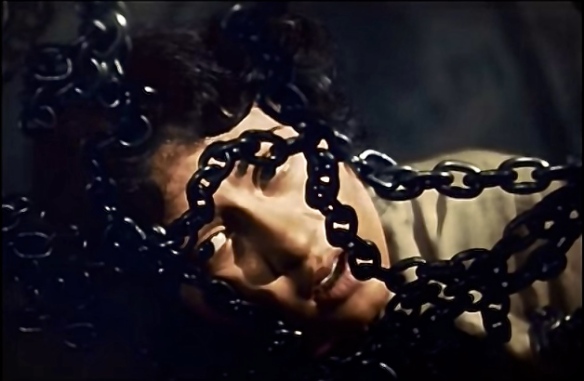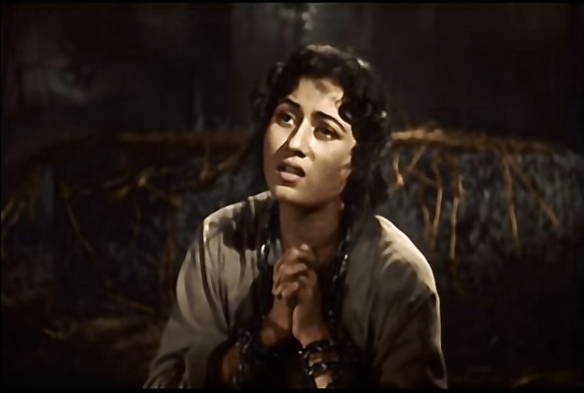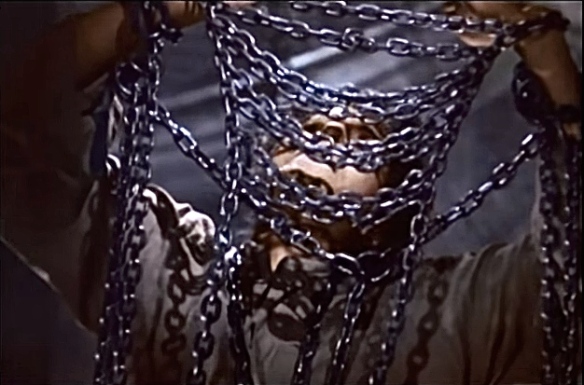Today, we present the lyrics and English translation to a treasured gem from the regal soundtrack of K. Asif’s Mughal-e-Azam (1960): bekas pe karam kiijiye. Imprisoned by Emperor Akbar for falling in love with Prince Salim, Anarkali sings this song as a plea for mercy and delivery from her troubles. This composition is an example of a naat — a song in praise of the Prophet Mohammed — and it remains one of the most beautiful naats to grace Bollywood’s silver screen to this day.
For the soundtrack of Mughal-e-Azam, Naushad and Shakeel Badayuni teamed up to create a lyrical and musical masterpiece whose iconic splendor shines brightly in the annals of Hindi cinema. In particular, this composition has been tuned skillfuly by Naushad to the lilting notes of Raga Kedar, an ancient and revered raga named after Lord Shiva that is known for its complex melodic phrases and evocation of the shanta (tranquil) rasa. The tranquil piety of this song has been expressed most beautifully by melody queen Lata Mangeshkar, whose artistic genius is featured prominently throughout this film’s soundtrack. Not surprisingly, for a special record released in 1967 on the occasion of her silver jubilee in playback singing, Lata selected bekas pe karam kijiye as one of the top ten favorite songs of her career. Take a listen to a live version of this song from Lata’s famous Royal Albert Hall debut (London, UK) in 1974. Flawless as usual!
The poetry of this song employs a number of phrases and metaphors that are traditionally found in naats and other Muslim prayer songs. Specifically, Mohammed is referred to as mushkil-kushaa.n (remover of difficulties) and sarkaar-e-madiinaa (leader of the holy city Medina). The city of Medina occupies a revered position in Muslim history because it is believed that the migration of Mohammed and his followers from Mecca to Medina to escape perseuction in the year 622 A.D marks the beginning of the Islamic Era. In addition, this song employs two common metaphors used in religious songs to describe tragedy and misfortune: an ark stranded in a whirlpool (bha.nvar me.n safiina) and the sinking boat (Duubtii kashtii). Along with Madhubala’s devastating portrayal of Anarkali, such lyrics throughout the soundtrack of Mughal-E-Azam provide additional poignancy and artistry to the narration of this tragic epic.
See our translation of Teri Mehfil Mein Qismat Aazmaakar for more discussion about Mughal-E-Azam, and stay tuned as we translate the rest of the songs from this monumental film. Until next time…
-Mr. 55
Bekas Pe Karam Kijiye: Lyrics and Translation
Oh, my savior! Please heed this complaint.
aap ke hote hue duniyaa merii barbaad hai
Although I remain devoted to you, my world is being destroyed.
bekas pe karam kiijiye, sarkaar-e-madiinaa
Please have mercy upon this wretched soul, oh leader of the holy city.
gardish me.n hai taqdiir, bha.nvar me.n safiinaa
hai vaqt-e-madad, aaiye bigaDii ko banaane
As the time for aid has arrived, please come and resolve my troubles.
I keep no tales of my heart hidden from you.
zakhmo.n se bharaa hai kisii majbuur kaa siinaa
This helpless devotee’s chest is marked by many wounds.
chhaayii hai musiibat kii ghaTaa gesuuo.n vaale
The dark lock-like clouds of misfortune have cast upon me.
lilaah merii Duubtii kashtii ko bachaa le.n
May the Lord rescue my sinking boat.
tuufaan ke aasaar hai.n, dushvaar hai jiinaa
With signs of an impending storm, my life is in danger.
Please have mercy upon this wretched soul, oh leader of the holy city.
Glossary
mushkil-kushaa.n: remover of difficulties, savior; fariyaad: complaint; barbaad: destroyed; bekas: wretched, destitute; karam karnaa: to have mercy; sarkaar-e-madiinaa: leader of Medina (holy city of Islam), God; gardish: cycle; taqdiir: fate; bha.nvar: whirlpool; safiinaa: ark; vaqt-e-madad: time for aid; bigaDii banaanaa: to resolve troubles; poshiidaa: hidden; fasaanaa: tale; zakhm: wound; majbuur: helpless; siinaa: chest; musiibat: misfortune; ghaTaa: cloud; gesuuo.n: locks, hair; lilaah: Allah, God; kashtii: boat; tuufaan: storm; aasaar: signs; dushvaar: difficult, arduous.




Pingback: What Killed Madhubala: A Close Look at the Death of A Bollywood Icon | Mr. & Mrs. 55 - Classic Bollywood Revisited!
What a song! A heart wrenching tune, aided by beautiful lyrics and off course the mesmerizing of Lataji. Thank you for the translating this song and your explanation of the creative thought process that went behind the song was simply superb.
to begin with, every Lata solo from Mughal-E-Azam is a firm favourite of mine…Bekas Pe Karam Kijiye would probably peak at #2 on my personal chart, with the light and breezy Ae Ishq Yeh Sab Duniyawale, which was unfortunately edited out from the 2004 remastered and colourised edition of the film, topping the list at #1…but to be honest, all the Lata solos in this film are winners in their own right…
Bekas Pe Karam Kijiye has a strange sort of significance in my life…4 years ago, on a calm, sunny morning in hostel, I was woken by a phone call from my mother, who confided in me the sudden demise of my late grandmother and requested that I head to the airport immediately to take a flight home. I remember feeling so morbid, lost and emotionally paralysed as I made my journey to the airport. I had my earphones on, but I was just not in the mood, yet the prevailing silence that seemed to permeate my surroundings was starting to grow on me, so I browsed through my mp4 player in a last-ditch attempt to restore at least a bit of my emotional footing…
Given that I am not a spiritual person by nature, nothing seemed to “suit the occasion”, until I came to the folder labelled “Lata Mangeshkar”, which contained a modest collection of Lata solos that I have “amassed” over the years that continues to expand today. I opened the folder and randomly selected the first song in the list, which I can’t remember at present. However, I do remember skipping song after song until the words “aye mere mushkil-kusha, fariyaad hai, fariyaad hai” wafted into my ears. I finally stopped pressing the “Next” button, as Lataji’s ethereal voice, raw with heartfelt emotion glided so effortlessly through the soul-stirring poetry of this naat…words cannot describe how consoled and pacified I felt as I savoured every second of the song, so much so that it was the only song I listened to, right until the moment I set foot on the plane bound for home.
I am still stubbornly at odds with my spiritual side, if there is one at all in the first place, but I must admit that being comforted by the voice of the Eternal Nightingale resounding throughout the eloquent verse of a religious poem during my bleakest moment of utter disenchantment was, to say the least, an otherworldly encounter that I will always cherish…
thank you Mr and Mrs 55 for sharing what is coincidentally a filmi classic that I hold very close to my heart…your excellent translation of the lyrics into English has done it an impeccable justice, a job well done, in short…God bless u… 🙂
best wishes and xoxo from Malaysia
Hi Gaby,
Thank you for sharing your touching story. We are glad that this song holds a special place in your heart and hope that our translation has done it justice.
-Mr. 55
Naushadsaab was the inaugural winner of the prestigious FILMFARE award-
yet thereafter, delivering some great melodies-“Mere Mehboob”, notably, he just didn’t get recognition..
His constant companion, Shakeel Badayuni, won three in a row, and he too, after a few nominations, also “left the scene”………………….
An excellent combo!
Reblogged this on Kabir Sir's Demosite and commented:
This composition is an example of a naat — a song in praise of the Prophet Mohammed — and it remains one of the most beautiful naats to grace Bollywood’s silver screen to this day.
Thank you for this translation and write-up. When a film repeats an old theme, comparison with the earlier production cannot be avoided.
I saw Anarkali as a teenager, and its impact was tremendous. Its music made such a direct appeal to the heart- its effect was magical, transformative and lasting. Compared to the lavish Mughal -e -Azam, Anarkali was simple , unsophisticated and unpretentious, But its appeal was all the greater for all its lack of glamour and glitter.
I remember the release of Mughal -E-Azam was accompanied by unpleasant controversy. The personal equation between the leading stars made for publicity and expectation. Mughal-E- Azam was surely a better spectacle, but for me it failed to appeal to the heart.
I used to see Hindi movies only for the music- the stars, stories were not important. Mughal-e-Azam has no doubt good music, but it is a contrived sophistication, Anarkali’s music was more spontaneous and lilting.
As for this particular song, it is good and I am able to appreciate it better after your translation. Even so, as a desperate, direct appeal to Divinity, O Aasmanwale from Anarkali ranks higher. No doubt Shakeel Badayuni was a great poet- he has many gems to his eternal credit. But here in this song, he has unconsciously echoed a sentiment from O Aasmanwale. The line,
“Aap ke hote hue duniya meri barbad hai”
directly recalls the line
” Tu dekh ta rahe aur duniya hamein saza de ”
from the earlier poem of Hasrat Jaipuri.
Reading both poems together, I feel that O Aasmanwale suits the image of an innocent Anarkali better. Like the film itself, Hasrat Jaipuri’s lyrics have a direct simplicity. Both poems are good in their contexts. I am not passing judgement on their poetic quality, I am merely expressing the impact they had on me. May be because I saw Anarkali first , and at a more impressionable age, I cannot imagine any one else as Anarkali but Bina Rai. And I cannot shrug off the impact of O Aasmanwale. May be, I have not grown up!
To me the meaning of the word ‘fariyaad’ is not a complaint but ‘an entreaty’. The songs are all fabulous, this ‘naat’ pierces the heart. I am sad to hear that they used the real chains on Madhubala, why could they not have made some chains lighter than the ones used in that era?